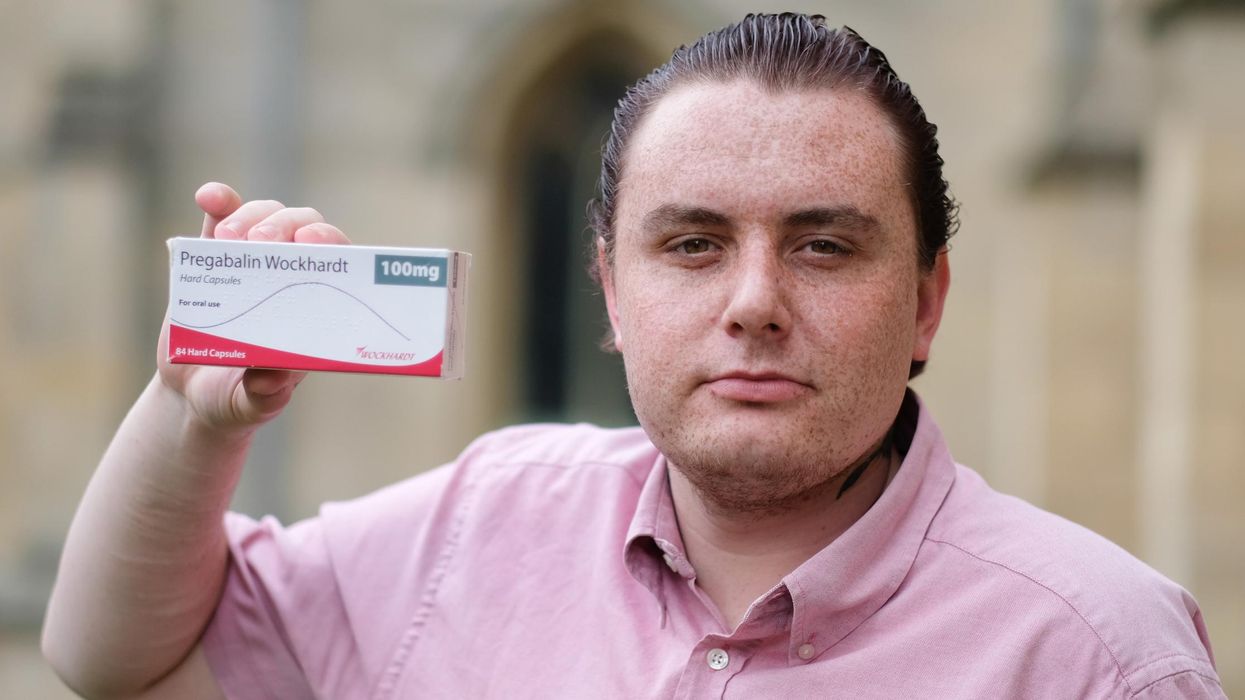News
Narjas Zatat
Apr 17, 2018

Tom Maddick / SWNS.com
LGBT+ organisations are challenging a man who claimed taking painkillers made him gay.
Twenty-three-year-old Scott Purdy started taking the painkiller Pregabalin after he broke his foot go-karting, SWNS reports.
He claims that not long after, he stopped feeling sexually attracted to women and broke up with his girlfriend of six months. Instead, he says, he started to feel sexually attracted to men – and he blames the painkillers.
Purdy says:
I noticed my libido for women had gone and I was wanting male attention. I was with a girlfriend I had been with for around six months.
I had never been interested in men. When I was younger I was a little bit curious but a couple of weeks after I started taking it I turned around and said I didn’t find her physically attractive anymore. She knew I was taking Pregabalin.
He claims he stopped taking the painkiller for a few weeks “and the desire for men just left”.
He adds:
I’m very happy. I want to keep on taking it because it makes me feel happy about my sexuality. It’s made me feel very open. It’s liberating. Pregabalin is also used to control paranoia and anxiety.
It’s made me so open and not bothered what people think or say. I had been taking it for a few weeks and I have come to the realisation that when I take it I want males.
The idea that homosexuality is a medical condition, or that one’s sexuality can be changed manually is considered an outdated – and worrying – concept which is closely linked to rhetoric about gay conversion therapy and sexuality as pathology.
Purdy’s implications didn’t sit well with LGBT+ organisations.
Rosella Nicosia, mental health lead at LGBT Foundation said:
Many LGBT+ people struggle to accept their sexual orientation and/or gender identity.
To state that painkiller medication has an altering effect [on] sexual orientation and/or gender identity is damaging for people who are going through what can be a very difficult and challenging time.
Dr Simon Latham, medical officer at Push Doctor told indy100 that Pregabalin, or ‘Lyrica’, is used to treat anxiety, as it “affects the way neurotransmitters in the brain work, which can result in “reducing anxiety, seizures and pain”.
He says that there are many side effects to the medicine such as: "feeling drowsy, dizziness, diarrhoea, sickness, mood changes and sexual dysfunction (affecting someone’s ability to take part in sexual intercourse)”.
He adds that “sexuality is complex” and that “it would be difficult to say that Pregabalin… affected someone’s sexuality”.
There have been a number of outlandish studies that attempt to “prove” that external factors can somehow turn a person gay. A widely covered study claimed that taking paracetamol when pregnant could make your child “less manly”. It was later debunked by BuzzFeed. Another strange study attempted to prove that eating “fatty foods” turned people gay, while a third advised men not to ejaculate, as that would help “reverse” homosexuality.
These ideas, according to LGBT+ rights charity Stonewall, feed into the idea that sexuality can be forcibly changed by external influences.
A spokesperson told indy100:
There have always been attempts to suggest that there is ‘something in the water’ causing same-sex attraction. But we know that while sexual orientation can certainly be fluid, it cannot be forcibly changed by external influences.
This is one of the reasons why so-called conversion therapy has been so widely condemned by medical professionals and governing bodies. What often prevents someone from coming out is anxiety about acceptance from society, which is why we ran our famous campaign ‘some people are gay, get over it’.
We need people to understand that same-sex attraction is natural, normal and not something that needs to be changed.
Consultant clinical forensic psychologist Dr Mike Berry, told indy100 that Purdy's generalised anxiety about is his sexuality may have been relieved thanks to the medication, which is why he is more "comfortable" being gay.
He appears to be more accepting of his gay status but is using the medication to explain his underlying interest the same way people use alcohol to excuse their sexual behaviour. For example: 'It was not like me to be sexual, it was the booze!'
It has been suggested that his behaviour may have a damaging impact on the LGBT+ movement blaming medication for his homosexuality.
Some cynics would suggest that he may be looking for a financial benefit telling his story, including compensation from the drug company or the mass media.
More: Psychiatrist who tried to 'cure' gay people had sex with male patients in his office
More: Gay teacher 'fired after wedding photos were shared online'
Top 100
The Conversation (0)













